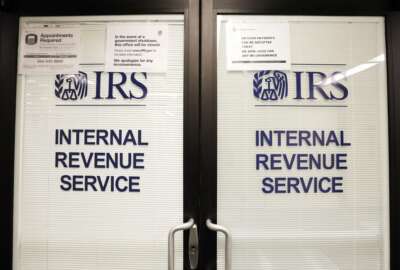IRS gearing up for next filing season but still dealing with 6M tax return backlog
The agency will start accepting and processing 2021 tax returns on Jan. 24, more than two weeks earlier than when it started last year’s filing season.
The IRS, still reeling from two filing seasons complicated by the COVID-19 pandemic, is gearing up for a third.
The agency will start accepting and processing 2021 tax returns on Jan. 24, more than two weeks earlier than when it started last year’s filing season.
Taxpayers will have until April 18 to file their tax returns or request an extension through Oct. 17.
Treasury Department and IRS officials, however, are warning taxpayers to prepare for processing delays as the agency deals with a backlog of tax returns and correspondence.
National Taxpayer Advocate Erin Collins, in her annual report to Congress, called calendar year 2021 “the most challenging year taxpayers and tax professionals have ever experienced.”
While her report focuses on problems the IRS encountered last year, Collins said she’s “deeply concerned” about the upcoming filing season.
The IRS has a backlog of about 6 million unprocessed individual tax returns, 2 million unprocessed amended individual returns and 5 million pieces of taxpayer correspondence.
Members of Congress, meanwhile, are pressing the agency about complaints from constituents.
Rep. Gerry Connolly (D-Va.), chairman of the House Oversight and Reform Subcommittee on Government Operations and Katie Porter (D-Calif.), the subcommittee’s vice chairwoman, sent a letter to IRS Commissioner Chuck Rettig raising concerns about the backlog and “inexcusably absent customer service”
The members request a briefing from Rettig before the end of the month on how the IRS plans to process tax returns for vulnerable households and small businesses.
The IRS received 282 million calls last year, Collins found, but only answered about 11% of those. Her report found that those who go through to a call center representative had an average hold time of 23 minutes.
Questions about the expanded child tax credit caused the 2021 call volume to more than triple, compared to the previous year.
IRS Commissioner Chuck Rettig told the committee last August that call volumes have not only strained the limits of its workforce, but also the technology it uses to process calls.
“The volume has also significantly hampered our ability to manage telephone demand based on the capacity limitations of our telephone routing equipment that is used to place callers in line for service,” Rettig said.
Chad Hooper, president of the Professional Managers Association, which represents IRS managers, said the agency has streamlined some operations since the start of the pandemic, but continues to see its workload outpace a shrinking workforce.
“We used to have teams of people who would answer letters and teams of people who would answer the phone, but we’ve been cut, and cut, and cut, to the point where now we have to make a decision as managers: Are we answering letters today? Or are we answering the phone today?” Hooper said in an interview.
Record-breaking COVID-19 infections, meanwhile, have complicated plans for IRS employees to return to the office in early 2022. Hooper said that for the most part, the IRS currently has “as many people working from home as can allow” until conditions improve.
“Our workforce is working remotely and not necessarily in the most efficient manner, because IRS workers never really had a lot of experience doing that,” Hooper said.
Hooper said the IRS workforce can, for the most part, can chip away at the backlog of tax returns remotely, but is hampered by the volume of mail the agency receives.
“Paper is the IRS’s Kryptonite, and the agency is still buried in it,” Collins wrote.
Rettig on Monday urged taxpayers to file their tax returns electronically this year, to reduce processing times.
Hooper said filing electronically allows the IRS to ensure that all the data is there before it even accepts the return, reduces the time spent on error resolution, and ensures faster processing times for tax returns.
But in some cases, like when a taxpayer needs to file an amended tax return, the IRS is unable to process certain tasks electronically.
“The IRS simply can’t afford to make electronic the amended return process. They’re trying to, in a limited fashion, roll that out currently, for certain tax years in certain situations, but it costs hundreds of millions of dollars to make a tax form electronic,” Hooper said.
The IRS warned of staffing shortages and budget cuts before the pandemic and has taken on significantly more work since the start of the pandemic.
The agency has issued 478 million Economic Impact Payments to households and more than and $93 billion in monthly payments under an expanded child tax credit.
As for its normal duties, Collins said the IRS workforce has shrunk by 17% since fiscal 2010, while the volume of individual tax returns has increased by 19% over the same period.
The report credit the IRS workforce for operating under difficult circumstances. But Collins said the “imbalance between the IRS’s workload and its resources has never been greater.”
The Build Back Better Act would have given the IRS $80 billion over a decade to rebuild its workforce, improve its enforcement operation and improve the quality of its taxpayer experience. That spending plan, however, is not likely to pass in its current form since it doesn’t have the support of all Democrats in the Senate.
The agency, however, continues to see its workforce shrink from attrition. IRS last year expected 52,000 employees to retire or leave the agency over the next six years. The agency has a workforce of about 83,000 employees.
“In the next three or four years, we’ll be running into a very critical staff crisis and a knowledge loss, as our older employees choose to retire, rather than work under these conditions,” Hooper said.
In addition to an aging workforce, the IRS has some of the oldest continuously running IT systems in government. Some of its core computing systems turn 60 years old this year.
“The seams were always beginning to show, and how this service was being impacted by this war of attrition on its budget. But now, I think it’s beginning to rip a little bit,” Hooper said.
Copyright © 2024 Federal News Network. All rights reserved. This website is not intended for users located within the European Economic Area.
Jory Heckman is a reporter at Federal News Network covering U.S. Postal Service, IRS, big data and technology issues.
Follow @jheckmanWFED






